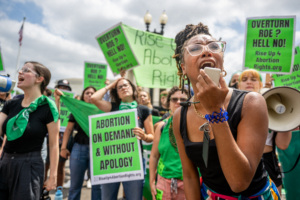Editor’s Note: Church & State is pleased to announce the winners of Americans United’s annual Student Contest. This year, we received over 900 submissions and awarded 12 prizes for essays and videos in high school and college categories.
Students were asked to respond to the following: What is your vision for church-state separation? What would happen if we secured separation of church and state in the United States and all people were able to live as themselves and believe as they choose?
A committee of AU staff members selected the winners. Kylie Marozsan from Langhorne, Pa., who attends the University of Miami, won first place in the college essay division. Aisha O’Neil of Durango, Colo., who will graduate from Durango High School in 2024, won first place in the high school essay category. Emily Ciulla of Peoria, Ariz., a student at Northern Arizona University, won first place in the video division for college students, while Hannah Kamseuh, who attends Milton Hershey School in Hershey, Pa., won first place in the high school video category.
The essays by Kylie and Aisha appear in this issue, and we have a Q&A with both of them.
To read more winning essays and to see the winning videos, visit: au.org/student-contest-winners-2023.
Just imagine!
When we dare to visualize a world free of religious oppression and control, there’s no limit to what we can achieve
By Kylie Marozsan

(Illustration by Madelyn Kelly & StefaNikolic)
Cue pianoforte. Imagine there’s no heaven. It’s easy if you try. To say that John Lennon’s opening lines were controversial in 1971 is an understatement. While Lennon was envisioning a world with peace given the current circumstance of war, his lyrics also sing of life free from religious oppression and force-fed religious dogma.
Over half a century has passed since these famous lyrics were composed, yet here I stand, humming the tune, questioning how we have seemed to revert to the conservative ways of the past. A past where laws, teachings and everyday life choices are framed by Judeo-Christian beliefs despite scientific advancements and centuries of religious freedom. I imagine the world, as Lennon proposed — a world free from religious influence over schools and laws — a world living in peace and harmony.
Imagine. No hell below us. Above us, only sky. Fear is the greatest tool of a propagandist. Belief in hell is a fear of the masses. But, what if there isn’t a hell? What if this life is all there is? How would this world look? How different would it be?
For starters, Texas classrooms would be free from being mandated to display the Ten Commandments as is currently proposed/passed by the Texas Senator Phil King (R-Weatherford) in his Senate Bill 1515, which now heads to the House for consideration. King said during a committee hearing earlier this year that the “Ten Commandments are part of American heritage and it’s time to bring them back into the classroom.”
While King and his counterparts argue that bills such as these are in support of religious freedom, they prove to only be pro-Christian. King’s statements such as, “Bringing the Ten Commandments and prayer back to our public schools will enable our students to become better Texans,” showcases the danger of allowing the lines of church and state to be blurred. Although it seems as if each day brings a new challenge to the separation of church and state, particularly in the classroom, I am still hopeful that my generation will be the generation to stop it. We have a voice. We have convictions. We vote. You may say I’m a dreamer. But I’m not the only one. Imagine there’s no countries. It isn’t hard to do. Nothing to kill or die for. And no religion, too.
I never thought that as a woman born in 2004 that I would have fewer rights than my mother, who was born in 1975. From birth to the end of her natural cycle of childbearing years, my mother never had to worry that someone would tell her that she had to give birth, that she had to be a mother. That was her choice. My right to choose what happens to my body, to my future, has been usurped by religious conservatives on the Supreme Court of the United States.
The court, which is supposed to operate completely free from religious and political influence, overturned 50 years of guaranteed rights, rights that were based on science, not religion. Now, states are pitted against one another, and laws are more convoluted and harsher than ever. For instance, a woman in South Carolina could soon face the death penalty if she has, by South Carolina’s laws, an illegal abortion. “H.3549, titled the “South Carolina Prenatal Equal Protection Act of 2023,” would ban abortion and criminalize it as homicide, meaning women who get abortions could face penalties ranging from 30 years in prison to a death sentence.”
It is simply mind-boggling that a woman can be executed for having a medical procedure, even if to save her own life. Courts and lawmakers have overstepped their authority when forcing their religious convictions on others. It seems with each new week, somewhere in the United States, we step closer and closer to the fictional, dystopian world of Margaret Atwood’s The Handmaid’s Tale — a world where women have no rights. While gaining back the right to choose for women seems an uphill battle, it is a constitutional right that can be reinstated.
At present, it may seem as if William Butler Yeats and his visionary poem, “The Second Coming,” are coming to fruition as, “The best lack all conviction, while the worst/Are full of passionate intensity.” Once again, the vocal minority — those who want to end the separation of church and state — cannot be allowed to frame the laws of the land. The majority has a voice. The majority has convictions. The majority needs to vote.

Legal abortion: Gen Z sees an erosion of rights (Photo by Brandon Bell/Getty Images)
You may say I’m a dreamer. But I’m not the only one. A world living in peace and harmony may seem a pipe dream — the white whale of society. However, it shouldn’t be impossible. The people of the United States should be able to live in a society where church and state are separated. This type of society can exist, for it is the basis of America. No one religion should be seen as more important or be more influential than another. Furthermore, religious dogma should not be the grounds for public policy or private medical decisions.
Maybe I am just young and naïve. Maybe I am a dreamer. You may say I’m a dreamer. But I’m not the only one. I hope someday you’ll join us. And the world will live as one.
Growing up on the outside
My experiences as a religious minority led me to embrace separation of church and state
By Aisha O’Neil

(Getty Images)
I grew up Jewish in one of the most Mormon places in America: Springdale, Utah. Religion was irrevocably connected to every segment of town life, from community gatherings to school assemblies. On Sundays, local businesses would halt, and around Christmas, every cashier would wish me a “Merry Christmas.” Still, in my youth, my parents attempted to shield me from the breadth of the discrimination we faced. The most frightening stories were the ones I learned only later, as a teenager. Principal among these was conflict over a school choir performance.
Springdale Elementary held a Christmas concert each year, during which students were heralded to a Mormon Church and taught to perform a series of religious hymns. My parents approached school administration with two small demands: (1) the name of the concert be changed to a “Holiday Concert” and (2) there be the addition of a singular Hanukkah song.
Given a provision in the school’s mission statement about equity, my parents thought their battle would be easily won. Instead, the school principal mentioned consulting a lawyer. A friend of my mom overheard my first-grade teacher say, “I don’t know why we’d sing a Hanukkah song when the Jews killed Jesus.” Although — after four contentious meetings — my parents finally were granted both of their demands, it remained difficult to shield my sister and me from the harsh truths of our country’s religious intolerance.
Springdale is a severe example of these inequities, but similar stories play out daily in cities and towns across America, emboldened by nothing less than the U.S. government itself. One of the first contracts of government made in America was the Mayflower Compact. This document, written by settlers of Plymouth Bay, set a precedent for freedom in the New World. It also began the history of Christianity in American governance. The agreement begins with the phrase “in the name of God” and goes on to name the colonists’ pilgrimage a journey “undertaken for the glory of God, and advancement of the Christian Faith.” This original popular subscription to Christianity soon took form as American policy, determining U.S. interaction with Native tribes, justification for atrocities against enslaved Africans and laws regarding the rights of LGBTQ+ communities and women.
To the ignorance of some, this Christianity continues into modern political rhetoric. In 1973, Richard Nixon popularized the phrase “God bless America.” From Ronald Reagan’s inauguration through the later Bush administration, this remark was repeated 49 times in major speeches. This religious rhetoric is not relegated to the presidency: during the Cold War, the phrase “under God” was added to the Pledge of Allegiance, and “In God We Trust” was reaffirmed as America’s national motto in 2011.
Belief in this God (and these statements do refer to a Christian God; I have never heard the name Adonai or Allah on a president’s lips) has become a sort of litmus for American politicians: if a man demonstrates strong faith in Christianity, he is a true American, and otherwise, he is not.
This has true consequences for religious tolerance in America. Establishing belief in God as a fundamental aspect of Americanism rationalizes the idea that those who are not Christian are different — less human. 1,590 incidents of religious hate crimes were reported to the FBI in 2021, the most recent metric available. This is a dramatic increase from 2020.
Perhaps more separation between church and state would not halt these crimes entirely, but it would denormalize them. My new synagogue has security cameras from every outdoor angle and a part-time security guard who volunteers for us over the holidays. But inside that small building, I feel safe. My Jewish identity is not defined by the hardship prejudice has forced upon me. It is characterized by the glow of Shabbat candles on Friday nights, the comfort of my safta’s matzah peach kugel on Passover and the beauty of prayers that begin with “baruch atah Adonai…” My culture has existed for over 2,000 years. It will continue, no matter the efforts of Christian extremists or certain governmental officials. The question, then, is not of my children’s faith but our society’s acceptance of them.
As much as America has failed in its commitments to religious freedom, it has endeavored to realize them. In 1649, 29 years after the signing of the Mayflower Compact, the Maryland Toleration Act was passed. The act was revolutionary — some of the only such legislation worldwide — and it guaranteed freedom of religion for all Christian settlers. Although not without flaws — the act prevented religious persecution only for Christians — this set a legal precedent for the First Amendment to the American Constitution.
Two hundred and fifty years ago, Jews could not vote in South Carolina, Georgia and New Hampshire. In Pennsylvania, only those who embraced Jesus as their savior had voting rights, and in New York, Jewish votes were often challenged. Today, Jews make up 6% of Congress and 19% of appellate judges. Perhaps the First Amendment to the Constitution did not state a guarantee but a commitment — that America must continue to fight for religious equality until true freedom of religion becomes a reality.
I envision a world for my children in which God is never written beside the American flag. Where among the desperate battles of politics, culture remains something sacred, untarnished and unspoken. In this world, every politician would have no choice but to condemn religiously motivated violence. Without the ability to use culture as a campaign slogan, religious discrimination would become akin to all other brutality in America: unacceptable. Debates over abortion would be relegated to the practices’ moral and medical implications and the rights of LGBTQ+ communities would not be discussed with Bible quotes. No culture could be “savage” or in need of a white savior because no culture would be politically popularized as inherently superior.
And maybe in this world, I will never be called to engage in a spoken battle over my daughter’s choir performance.


